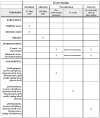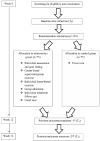Effectiveness of a motivated, action-based intervention on improving physical activity level, exercise self-efficacy and cardiovascular risk factors of patients with coronary heart disease in Sri Lanka: A randomized controlled trial protocol
- PMID: 35788765
- PMCID: PMC9255726
- DOI: 10.1371/journal.pone.0270800
Effectiveness of a motivated, action-based intervention on improving physical activity level, exercise self-efficacy and cardiovascular risk factors of patients with coronary heart disease in Sri Lanka: A randomized controlled trial protocol
Abstract
Background: Coronary heart disease (CHD), is the major contributor to cardiac-associated mortality worldwide. Lifestyle modification, including physical activity, is highly recommended for secondary prevention for patients with CHD. However, many people in Sri Lanka with CHD do not engage in adequate physical activity.
Objective: To develop a culture-specific, motivated, and action-based intervention and examine its effects on physical activity level, exercise self-efficacy, and cardiovascular risk factors among patients with CHD.
Methods and materials: This is an assessor-blinded randomized controlled trial that will recruit 150 patients with CHD from the inpatients cardiac unit of a hospital in Batticaloa, Sri Lanka, and will randomly assign them either to the intervention group or the control group. The participants in the intervention group will receive a culture-specific and motivated, action-based intervention in addition to the usual care, while participants in the control will only receive the usual care. The intervention consists of a face-to-face preparatory session and 12-week motivated, action-based sessions which were developed based on the health action process approach (HAPA) framework. The face-to-face preparatory session will identify the health needs of the participants, develop a goal-oriented patient-centered action plan, and provide knowledge and an overview of the program. The 12-week motivated, action-based sessions consist of three monthly group education and center-based group exercises, followed by three 20-min individualized telephone follow-ups. Outcomes will be assessed immediately after the intervention and at one-month post-intervention.
Discussion: This protocol proposes a supervised centered-based group exercise with group education, and individualized telephone follow-ups guided by the HAPA framework to improve the physical activity level, exercise self-efficacy, and cardiovascular risk factors of patients with CHD. Results from this study will inform the effectiveness of a motivated, action-based intervention in a low-resource setting and provide information on the feasibility, barriers, and facilitators for lifestyle modification in Sri Lanka.
Trial registration: ClinicalTrial.gov.org PRS: NCT05051774; Date of registration: September 21, 2021.
Conflict of interest statement
The authors have declared that no competing interests exist.
Figures
Similar articles
-
Effectiveness of eHealth cardiac rehabilitation on health outcomes of coronary heart disease patients: a randomized controlled trial protocol.BMC Cardiovasc Disord. 2019 Nov 29;19(1):274. doi: 10.1186/s12872-019-1262-5. BMC Cardiovasc Disord. 2019. PMID: 31783800 Free PMC article.
-
Effectiveness of a self-management intervention with personalised genetic and lifestyle-related risk information on coronary heart disease and diabetes-related risk in type 2 diabetes (CoRDia): study protocol for a randomised controlled trial.Trials. 2015 Dec 2;16:547. doi: 10.1186/s13063-015-1073-7. Trials. 2015. PMID: 26631181 Free PMC article. Clinical Trial.
-
In-classroom physical activity breaks program among school children in Sri Lanka: study protocol for a randomized controlled trial.Front Public Health. 2024 Apr 22;12:1360210. doi: 10.3389/fpubh.2024.1360210. eCollection 2024. Front Public Health. 2024. PMID: 38711768 Free PMC article.
-
Physical Activity after Cardiac EventS (PACES) - a group education programme with subsequent text-message support designed to increase physical activity in individuals with diagnosed coronary heart disease: study protocol for a randomised controlled trial.Trials. 2018 Oct 4;19(1):537. doi: 10.1186/s13063-018-2923-x. Trials. 2018. PMID: 30286797 Free PMC article.
-
Mediterranean-style diet for the primary and secondary prevention of cardiovascular disease.Cochrane Database Syst Rev. 2019 Mar 13;3(3):CD009825. doi: 10.1002/14651858.CD009825.pub3. Cochrane Database Syst Rev. 2019. PMID: 30864165 Free PMC article.
Cited by
-
Physical Activity Interventions Framed by the Health Action Process Approach for Adults with Long-Term Conditions: A Scoping Review.Int J Behav Med. 2024 Dec;31(6):987-1017. doi: 10.1007/s12529-024-10305-2. Epub 2024 Jul 15. Int J Behav Med. 2024. PMID: 39009797 Free PMC article.
References
-
- American Heart Association. Coronary artery disease-coronary heart disease. [Internet]. 2015 [cited 2021 Oct 2]. https://www.heart.org/en/health-topics/consumer-healthcare/what-is-cardi...
-
- World Health Organization. The top 10 causes of death. [Internet]. 2020 [cited 2021 Oct 2]. https://www.who.int/news-room/fact-sheets/detail/the-top-10-causes-of-death
-
- Nowbar AN, Gitto M, Howard JP, Francis DP, Al-Lamee R. Mortality from ischemic heart disease: Analysis of data from the world health organization and coronary artery disease risk factors from NCD risk factor collaboration. Circ Cardiovasc Qual Outcomes. 2019;12(6):1–11. doi: 10.1161/CIRCOUTCOMES.118.005375 - DOI - PMC - PubMed
-
- Abbafati C, Abbas KM, Abbasi-Kangevari M, Abd-Allah F, Abdelalim A, Abdollahi M, et al. Global burden of 369 diseases and injuries in 204 countries and territories, 1990–2019: a systematic analysis for the Global Burden of Disease Study 2019. Lancet. 2020;396(10258):1204–22. doi: 10.1016/S0140-6736(20)30925-9 - DOI - PMC - PubMed
Publication types
MeSH terms
Associated data
LinkOut - more resources
Full Text Sources
Medical



